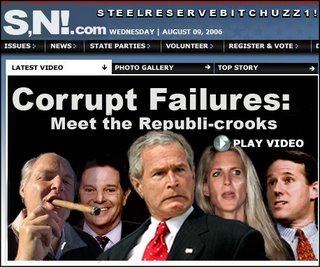
So, you're running for office and you think the internet can help. Well, maybe it can, maybe it can't.
As I was checking returns Wednesday morning, I noticed that some of the most active internet candidates got their asses stomped. They had sent tons of press releases, blogged, and in one case, sucked up in person. Yet, I didn't write a word on their races.
Why?
Because their campaigns sucked. Or I didn't care about them. Or they were 2500 miles away. In short, they wanted my attention because I run a "well-trafficked national blog", what ever that means. But they didn't get it. Vote Vets did. Various stories on Lamont and Webb and Steele did. Why? Because they were better stories.
In the future, the Lamont campaign will be used as a model for internet outreach, and it's director Tim Tagaris will be a wealthy consultant. Why? Because they actually chose to work with bloggers like they did the other media.
And most importantly, they coordinated their work with each other.
So here are some helpful tips
1) Fundraising has limits
We are not your bank. It is not our job to give you money. You need to be as creative online as off in raising cash. You need to ask for money in ways which will make people give it to you. Which means explaining what you stand for and what you plan to do in office. We like fighters. The harder you fight, the more support you get.
2) Target your audience.
I don't live in Montana. I don't care about your governor's race. You need to reach the people who do care about such things. Local blogs have local audiences and local messages. Don't just think a Kos diary will solve your problems. Local blogs are run by people with local concerns and may be more than willing to support you and your campaign.
3) Blogging is a tool, not a way of life.
Juse because you blog, it doesn't mean that people will flock to you. It's simply a way to communicate with people online. Not a magic tool which will make unicorns appear riding the waves from Atlantis. If you can communicate well, it will help you. If not, it can hurt you and your campaign
4) There are two kinds of bloggers
You have activists bloggers, who want to work with you, and reporter bloggers, who will listen to your side. There is a difference. Josh Marshall vs Kos is a good example. Josh doesn't raise money, doesn't push candidates. Kos does. Some days it's real hard to tell the difference between the two, but Josh isn't going to push your campaign and Kos will. Both may be of use to your campaign, but they play by different rules.
When you deal with them, realize both are independent organs. You can't coopt them.
However, Kos is a community site, while Marshall is an editor. Which means they approach the news in a different way. Kos is self correcting, Marshall is editing. There is a difference.
5) There are three kinds of sites
Sole proprietorships-sites run by a single person, like Majikthiese, Escaton, Ezra Klein or Jesus's General. They may have guest posters from time to time, but it is the vision of one person and their ideas.
Group blogs-Technically, this is a group blog, with me and Jen consisting of the group. It may seem like a sole proprietorship, since I do most of the work, but Jen posts her own opinions, which may or may not match mine. Corrente, Pandagon, First Draft, Firedoglake are group blogs with a variety of opinions. The difference is that there are multiple voices and ideas expressed on the site within a common agreement on direction and general politics. This site is liberal, pro-union, pro-choice, but we differ on the details.
Community blogs-Kos is the largest and best known. A community site draws in a lot of different voices and basically exists as an online gathering place. It isn't centrally directed. You can have supporters and opponents on the same site.
6) Being online has to relate to being offline
There isn't a day when I don't get e-mail from minor candidates who expect that because they cultivate bloggers, that they will get a boost in their campaign.
Which is a mistake.
The Lamont campaign tied their online activities to support their offline activities. Bloggers came up with a devestating float called the Kiss which dogged Lieberman. That doesn't mean the campaign had anything to do with it. But they used their website as a way to get people to move from the computer to the street. Which is what a good campaign site has to do. It has to get people to act offline. Which means that they have to make it easy to volunteer locally and take action.
You have to inspire people to act. Without that, a blog is useless.
7) Blogggers are independent actors
They don't work for you. Which is good. Because you aren't responsible for what they write or say. Make that clear from the begining and you will save yourself a lot of trouble.
No comments:
Post a Comment